Reality / God
The "integration of the negative" rather than insisting that God values perfection or an idealized morality, Francis of Assisi intuited, through the example of Jesus’ life and death, that God could be found in all things, even those our religion and culture urge us to reject. Therapists call this pattern of admitting our shortcomings and failures “embracing our shadow.” Such surrendering of superiority, or even a need for superiority, is central to any authentic enlightenment. The Beatitudes are all about incorporating what seems like disorder (a negative), which promotes a much better and different level of consciousness. (Rohr)
Reality: The big mystery, the big pattern, the Big Real. Jesus called it the Reign of God; Buddha called it enlightenment. Philosophers might call it Truth. Many of us experience it as Foundational Love. (Rohr)
The pattern that connects, the life that Reality offers us is not death avoided, but always death transformed. In other words, the only trustworthy pattern of spiritual transformation is death and resurrection. Christians learn to submit to trials because Jesus told us that we must “carry the cross” with him (Matthew 16:24; Mark 8:34; Luke 14:27).(Rohr)
World Views
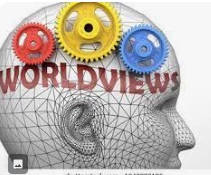
The incarnational world view (not material, spiritual, or priestly) in which matter and Spirit are understood to have never been separate. Matter and Spirit reveal and manifest each other. This view relies more on awakening than joining, more on seeing than obeying, more on growth in consciousness and love than on clergy, experts, morality, scriptures, or prescribed rituals. An incarnational worldview grounds Christian holiness in objective and ontological reality instead of just moral behavior. They can see Christ in the disfigured and broken as much as in the so-called perfect or attractive. They can love and forgive themselves and all imperfect things, because all carry the Imago Dei equally, even if not perfectly. (Rohr)
Christianity is the most radical of all world religions because it takes matter seriously as the home of divinity. Christ is the communion of divine personal love expressed in every created form of reality. Everything is christified because everything expresses divine love incarnate. What Jesus is by nature everything else is by grace (divine love). Christ is more than Jesus alone. Christ is the whole reality bound in a union of love. It means allowing God’s grace to heal us, hold us, and empower us for life. It means to let God’s love heal us of the opposing tensions within us. Open our eyes to see that the God I seek is already in me and in you. We are already One. (Rohr)
The Holy Trinity as defined by Catholicism is the Father, the Son, and the Holy Spirit - as "one God in three Divine person."
The three persons are distinct, yet are one "substance, essence or nature." In this context, a "nature" is what one is, whereas a "person" is who one is. Wikipedia: Holy Trinity
Creatheism - celebrates evolutionary emergence and the fact Universe itself is creative
Pantheism's claim: God is the Cosmos and the Cosmos is God.
Panentheism - meaning all/everything is in God. The divine pervades and interpenetrates every part of the universe and also extends beyond space and time. While pantheism asserts that "all is God", panentheism claims that God is greater than the universe. Some versions of panentheism suggest that the universe is nothing more than the manifestation of God.Wikipedia: Panentheism
God is Reality and MORE
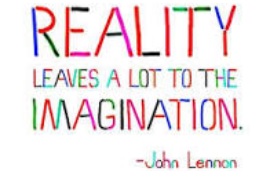
God: the supreme or ultimate reality
God is a person. But we do not mean that He is a human being. We mean that God possesses “personality” and that He is a rational Being with self-awareness.
The universe fashioned by the word and creative character of God was not immovable. It was not absolute and incapable of change. It was not immutable or static or, in the Greek sense, perfect. In the Hebrew poetry of Genesis 1, God’s creation was in process. It started simple and grew more complex. It started in chaos, and order took shape. It started without life, and life “sprang forth” and “multiplied.” Hebrew good is better than Greek perfect. In other words, Greek perfect is static, but Hebrew good is dynamic. Greek perfect is sterile and changeless, but Hebrew good is fertile and fruitful. (Rohr)
GOD IS NOT A PERSON; but is a mythic personification of reality. Given the nature of our brains, we've used metaphors and analogies to understand and relate to that which is unavoidably, undeniably real and/or mysterious. ALL images and concepts of God are more or less meaningful interpretations and personifications. faith has nothing to do with beliefs; it's about trust. Trust that reality is okay just as it is. God is a personification, not a person. Evolutionary emergence and the fact Universe itself is creative, I refer to as "creatheism" (www.thankgodforevolution.com/node/2010)
God being all of reality is both the good and the bad. Reality is a duality where the bad exists because the goodness of God allows freedom.
Since God is Love (1 John 4:8) and God is Spirit (John 4:24), then the Holy Spirit must be the relationship between others. And since God is a Creator, then new and higher evolving things can happen when that relationship is good. Just as nature is an unity of diversity, then it follows that mankind can evolve into super human beings like Jesus.
Without a sense of the inherent sacredness of the world—in every tiny bit of life and death—we struggle to see God in our own reality, let alone to respect reality, protect it, or love it. (Rohr, 5/20/20)
Accept the “laws of the universe,” which include disruption, dynamism and evolution, instead of clinging so tightly to the “law and order” of church and country. Jesus refused to enforce or even bother with what he considered secondary issues like ritual laws, purity codes, and membership requirements. He regarded them as human commandments, which far too often took the place of love (see Matthew 15:3, 6‒9).(Rohr,8/12/20)
The word sacrament is derived from a Latin phrase which means “to make holy.” When hit with the glint of love’s light, even ordinary things become holy. (Rohr)
Thomas Keating does not actually use the word “God” in this entire collection of poems. It is always “the Divine,” “I AM,” or “the Source.” He clearly did not want what he was trying to say here co-opted back into conceptions of a distant, male-gendered Being sitting up there in the heavens. He wanted us to keep our eyes on the big picture.(Rohr,10/21/20)
The word “God” is a stand-in word for everything—Reality, truth, and the very shape of our universe. God is Reality with a Face. In Scholastic philosophy, “whatever is received is received in the manner of the receiver.” This is one of those things hidden in plain sight, but it still remains well-hidden to most Christians.(Rohr)
Beginning with ourselves! The purpose of prayer and religious seeking is to see the truth about Reality, to see what is. (Rohr)
Someone Else is for us, more than we are for ourselves. All we can do is get out of the way. We realize that this is a radically benevolent universe, and it is on our side despite the absurdity, sin, pain, and dead ends. It will be more like letting go than taking on. Maybe this is why it is hard to accept.(Rohr)
One becomes aware of the hidden, that is, the ultimate reality (the Kingdom). The 'secret' is right in front of our eyes (p46). Reality is both phenomenal and essential all at once (p44). (Zen and the Gospel of Thomas)
Love is somehow the key that unlocks the door which leads to ultimate reality. (Rohr) Let us love one another, for love is of God. And everyone that loveth is born of God and knoweth God.(1 Jn 4:7)
The reality of God is intensely perceived as present in everything. The kingdom is hidden right here, even in the passions and illusions of our superficial consciousness. When we are shaken awake, we see it. (Rohr)
I Am That I Am

God/reality will become whatever man makes it to be.
Also "I am who I am", "I am what I am" or "I will be what I will be" or even "I create what(ever) I create". The traditional English translation within Judaism favors "I will be what I will be" (Wikipedia)
God’s way of assuring and pledging to Moses and Israel that God would become whatever they needed Him to become. In Israel's case – their deliverer. This promise found in the name of God can be extended to the world of mankind. God will become what they need Him to become – an architect for the plan of salvation that will bring them back into harmony with Him. (chicagobible.org/why-did-god-call-himself-i-am-that-i-am/)
When God identified Himself as I AM WHO I AM, He stated that, no matter when or where, He is there. It is similar to the New Testament expression in Revelation 1:8, “‘I am the Alpha and the Omega,’ says the Lord God, ‘who is, and who was, and who is to come, the Almighty.’” This is true of Him for all time, but it would have been especially appropriate for a message in Moses’ day to a people in slavery and who could see no way out. I AM was promising to free them, and they could count on Him! (www.gotquestions.org/I-AM-WHO-I-AM-Exodus-3-14.html)
The statement "I AM" comes from the Hebrew verb "to be or to exist." With this statement, God declared that He is self-existent, eternal, self-sufficient, self-directed, and unchanging. But this statement also declared that He is present with His people. He was aware of their suffering, He desired to deliver them. (www.compellingtruth.org/I-AM-WHO-I-AM-Exodus-3-14.html)
When God says I AM WHO I AM, he summons us to humble objectivity. God is who he is and nobody’s opinion of him makes any difference. Therefore, our calling as his creatures is to strive to know him for who he is, not for who we would like him to be. If God simply is who he is and not who we make him out to be, then it is we who must conform to God and not he to us. (www.desiringgod.org/messages/i-am-who-i-am)
God is a verb. The closest we can come to thinking about God is a process (God-ing, Loving, Creating) rather than a being.3,p69
God is more of a verb than a noun, more of a process than a conclusion, more of a dynamic relationship than a static idea. (p225, Healing the Divide)
Perfection cannot be perfect without the potential for perfecting!3,78
Catch a glimpse of the divine in the face of “the other.” Then God’s self-identification, “I am that I am / I will be who I will be” (Exodus 3:14) becomes a liberating example of awareness, mutuality, and self-revelation. Growing in awareness of a “Christ-soaked universe” helps us to awaken to wonder and see the divine in all things. (Rohr 6/24/20)
The best ally of God is realty - not theology, not ideology, not what should be as much as what is.6,p180
We all come from the source that is GOD, which can be described as Generator, Operator, Destroyer. The ultimate destination of man should not be to attain or achieve God, but to submerge or immerse into it. (Post Std, 12/7/21)
A Sacramental Reality / Universe
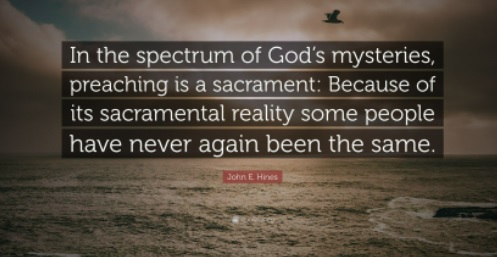
Invitation for us to celebrate the sacramental nature of all life and all beings. One of the classic definitions of a sacrament is something that is an outward, visible sign of an inward, invisible grace. Everything can be a sacrament, meaning every person, creature, plant, and object can be an opportunity to encounter something of the Divine Presence in the world. Sacramentality is a quality present in creation that opens us up to the Sacred Presence in all things. Sacraments reveal grace.(Rohr)
The more we cultivate intimacy with the natural world, the more we discover about God’s presence. It is a spontaneous reminder of God’s creative upwelling and expansive love, calling us to love beyond boundaries. This discovery that every creature and every created thing can be a window of revelation into the divine nature is an invitation to fall more and more in love with the world. Sacramental vision means not only that we grow in our love of God’s ways in the world but also that we grow in our sense of kinship with creation. There is a sense of God’s incarnate presence in creation that shimmers forth to reveal the holiness of all things. (Rohr)
Physical creation is both the hiding place and the revealing place of God.(p45, Jesus' Alternative Plan)
The one is the way to the many; the specific is the way to the spacious; the now is the way to the always; the here is the way to the everywhere; the material is the way to the spiritual; the visible is the way to the invisible. When we see contemplatively, we know that we live in a fully sacramental universe, where everything is an epiphany. While philosophers tend toward universals and poets love particulars, mystics and contemplative practice teach us how to encompass both. (Rohr)
Dwelling in sacred space ultimately involves seeing God and the world through a unified vision. But we don’t get there without some sort of suffering: Whenever we’re led out of normalcy into sacred, open space, it’s going to feel like suffering, because it’s letting go of what we’re used to. This is always painful, but part of us has to die if we are ever to grow larger (John 12:24). In this new realm, everything belongs. Darkness and light coexist, paradox is revealed. The secular becomes sacred. Teilhard de Chardin said, “Nothing here below is profane for those who know how to see.” There is only one world, and it’s the supernatural one. We need to refresh our seeing through contemplation because we forget. We start clinging and protecting. Unless there is a readiness to let go, we will not see the vision of the whole. God cannot be seen through such a small lens.(Rohr)
Let us place our first step in the ascent at the bottom, presenting to ourselves the whole material world as a mirror, through which we may pass over to God, who is the Supreme Craftsman. The Creator’s supreme power, wisdom and benevolence shine forth in created things. (St. Bonaventure)
Creation and the Spiritual World

Since E=mc2, if wonder if the big bang was the energy of Love that created the material universe (Randy)
The physical structure of the universe is love. (Teilhard de Chardin)
The material world is only the tip of an iceberg?
Saint Francis, faithful to Scripture, invites us to see nature as a magnificent book in which God speaks to us and grants us a glimpse of his infinite beauty and goodness.
The divine anointing began with the first incarnation when God decided to show God’s self, almost 13.8 billion years ago. Franciscan theology and part of our alternative orthodoxy shows it was there from the beginning, as the study of cosmology itself says that the very shape of the universe is dynamic and relational. It is all about relationship! Balancing Jesus with Christ gives us a vision that is so big, so universal that it includes every thing and everybody.
ALL images and concepts of God are more or less meaningful interpretations and personifications. Religion is not about God. Religions offer practices, that help adherents live in right relationship with each other, their society, and with reality as a whole—regardless of how that "reality" is mythically personified.www.thankgodforevolution.com/node/2010
In the beginning was Consciousness, and Consciousness was with God, and Consciousness was God.2,p50
Terence Fretheim suggests, the “Let us” discourse in Genesis [1:26] is a statement of the community of God. God is creating and ordering the universe, but does not do it alone.(Rohr,8/27/20)
Evil as we know it can never be eradicated for it fulfills a primary function in creation. Without something pulling us away from the Divine, we would lose our free will.3,p160
God is not the “author” of creation, removed and overarching; the whole thing is God. There is not a single place in all creation where God is not, because God is creation itself, endlessly outpouring, endlessly receiving itself back. From top to bottom, we live and move and have our being in a participative reality, every fractal joined to every other fractal in a symphony of divine becoming pouring forth from that infinite wellspring.(Rohr,10/21/20)
“The material and the physical can be trusted and enjoyed. This world and even this body are the hiding place and the revelation place of God! After the Incarnation, we hopefully realize that the material world has always been the privileged place for divine encounter. (Rohr,6/6/21)
God created an imperfect universe because if the universe were perfect, it would not be a universe at all - it would be God.11,p68
We meet God in creation because we meet God everywhere! Instead of a barrier to the spiritual life, creation is a doorway. The nature of the Creator is evident in the creation. Express reverence (not worship) for creation gives deep respect of the Creator's nature.(Rohr)
Jesus makes it clear that a life lived to fulfill God’s dream for creation will involve suffering.(Rohr)
See 'creation as very good' within Christainity
The Paradox and Mystery of God's Way

In Exodus 33:22-23 our knowledge of God is indirect at best, and none of our knowledge is fully face-to-face. God is always and forever Mystery. All we see is the “backside” of God.
It was not the indirectness that hit me in that passage, but the directness! My best spiritual knowing almost always occurs after the fact, in the remembering—not seen “until God has passed by.”
The foundation of faith is the ability to look at our entire salvation history and then trust that this pattern would never—could never—change! It is largely after the fact that faith is formed—and gloriously transmuted into hope for the future. Only after the fact can you see that you were being held and led during the fact. During the fact, you do not enjoy or trust your own strength at all, in fact, quite the opposite. You just cry out in various ways. Then God, for some wonderful reason, is able to fill the gap.
(Rohr, 4/13/20)
God alone can hold together all the seeming opposites and contradictions of life. In and with God, we can do the same. But we are not the Doer. (Rohr,4/17/20)
We cannot jump over this world, or its woundedness, and still try to love God. We must love God through, in, with, and even because of this world. (Rohr, 5/19/20)
God says you cannot solve the problem of suffering, you can only live the mystery. The only response to God’s faithfulness is to be faithful ourselves. Ultimately Job’s story reveals that God cannot really be known through theology and law. God can only be related to and known in relationship. Ultimately Job’s story reveals that God cannot really be known through theology and law. God can only be related to and known in relationship. Job's friends believe in their theology; Job believes in the God of their theology. It is a big difference. The first is information; the second is wisdom. (Rohr, 7/7/20)
Quantum physics now says that the uncertainity principle perhaps more truly express the final mystery of reality than classical physics ever did.6,p14Our uncertainity is the doorway into mystery, the doorway into surrender, the path to God that Jesus called "faith."6,p16
Only inside of this mystery of the exchange of love can we know God. If we stay outside of that mystery, we cannot know God. (Rohr,11/8/20)
Any “mystery,” by definition, is pregnant with many levels of unfolding and realization. (Rohr)
Power is always greatest when it is accompanied by the greatest restraint.11,p55
It seems that the universal law is that something must always die for something else to live. It feels especially tragic and unacceptable when that thing is not bad but good and seemingly necessary! Such is the “pattern that connects” all things.(Rohr)
Jesus shows us the paradox of disadvantages of advantages, and the advantages of disadvantages.(Rohr)
Life is a succession of dyings and risings. (Rohr) - see Gospel of Thomas logion 18 and see Pascal Mystery
There is a rhythm (and harmony) inherent in things: birth and death, light and dark, growth and decline, breathing in and out. (p69, The Way of Paradox)
The universe reveals God, yet at the same time veils him. (p73, The Way of Paradox)
See Wisdom's Paradox/Mystery of God's Way
The Mystery of Evil, Sin, and Suffering
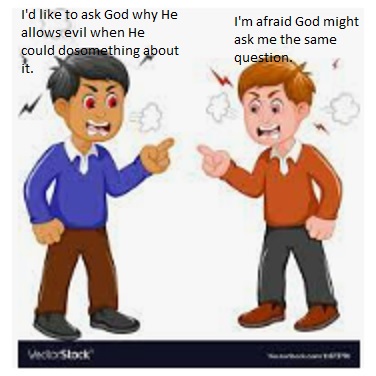
We are punished by our sins rather than for our sins.(Rohr)
When we see the nondual nature of the Kingdom (reality), we realize that it has both good and bad elements. (p114,Zen and the Gospel of Thomas)
In the midst of suffering, God can be trusted. The world is still safe, coherent, and even blessed.
Our knowledge of God is participatory. God refuses to be intellectually “thought,” and is only known in the passion and pain of it all, when the issues become soul-sized and worthy of us.
Into the belly of the beast, into a situation that we can’t fix, can’t control, and can’t explain or understand. That’s where transformation most easily happens. That’s when we’re uniquely in the hands of God.
If we could see all our wounds as the way through to their transformative effect, as Jesus did, then they would become “sacred wounds” and not something to deny, disguise, or export to others.
The genius of Jesus’ teaching is that he reveals that God uses tragedy, suffering, pain, betrayal, and death itself, not to wound or punish us, but to bring us to a Larger Identity: “Unless the single grain of wheat loses its shell, it remains just a single grain” (see John 12:24).
The shell must first crack for the expanded growth to happen. In such a divine economy, everything can be transmuted, everything can be used, and nothing is wasted.
(Rohr, 4/14/20)
St Francis looked to the underside of his society, those who had suffered, for an understanding of how God transforms us.6, p5
As long as we keep trying to deal with the mystery of evil in some way other than forgiveness and healing, we will continue to create negative idealogies.6,p11
If we agree to hold opposing energies creatively until they transform us, it becomes redemptive suffering.6,p19
We are saved, ironically, not by doing it right as much as by the suffering of having done it wrong. We come to God not through our perfection as much as through our imperfection.6,p22
It seems God only allows death and evil insofar as God can use it in our favor. In the Divine Economy nothing is wasted, not even sin, evil, or death. This is God's ultimate victory.6,p40
Over centuries, we became very used to equating evil with individual “sins” and we lost a sense of its collective nature. We largely missed that essential point, and thus found ourselves in the tight grip of monstrous social evils in Christian nations. (Rohr,10/11/20)
Seldom was the concept of sin used to bring discernment or deeper understanding, much less compassion or forgiveness, to the human situation.(Rohr,10/12/20)
By “world” we don’t mean creation or nature, but “the system”: how groups, cultures, institutions, and nations organize to protect themselves and maintain their power. This is the most hidden and denied level of evil and violence. We cannot see it because we’re all inside of it, and it is in our ego’s self-interest to protect this corporate deception.(Rohr)
The world (or “system” as we use the word now) is a hiding place for unconsciousness or “deadness” in the words of Paul. Both Thomas Aquinas and C. S. Lewis taught that the triumph of evil depends entirely on disguise. Our egos must see it as some form of goodness and virtue so that we can buy into it. If we do not see the true shape of evil or recognize how we are fully complicit in it, it will fully control us, while not looking the least like sin. Would “agreed-upon delusion” be a better description?(Rohr,10/13/20)
But your iniquities have separated you from God; and your sins have hidden His face from you, so that He will not hear. (Isaiah 59:2)
Evil, technically is NOTHING, it is an absence of what should be there; it is an absence of God. A good analogy would be a shadow. Stand in the sun on a bright day and look around, you can see everything fine, now turn you back on the sun and look down, what do you see? A shadow. What is the shadow? It is nothing, literally, it is the absence of light, because you are blocking the light. Same thing with evil. God does not create evil, we, through our sinful nature, block God’s goodness from reaching where it should be, and thus we create evil. God cannot “create” evil, He can only allow it to exist. And for that absence, it is us who are responsible.(www.quora.com)
Unity of Diversity

Life is not an 'either-or' proposition; it always includes the spirit of 'and'.3,p250
Religions offer a unified vision of reality because God is one and the reality which He created must have unity and integrity. A unified and integrated vision of reality in which God as the Creator has an intimate relationship with His creation. Since God is the only source of reality, He alone must be worshipped. www.resetdoc.org/story/religion-unity-and-diversity/
Synthesis - like H2O or mankind as body and spirit
see Inclusion and Unity of Diversity
Created Man in Image and Likeness
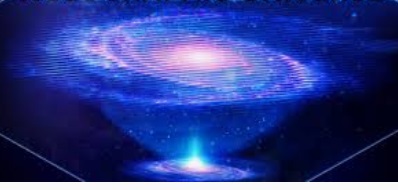
We are not loved because we are so beautiful and good. We are beautiful and good because we are loved. (Jürgen Moltmann)
And God said, Let us make man in our image, after our likeness. (Gen 1:26) The soul is first, in God’s image. This, as suggesting an external likeness, may refer to man’s reason, free-will, self-consciousness, and so on. But it is, secondly, in God’s likeness, which implies something closer and more inward. It refers to man’s moral powers, and especially to his capacity of attaining unto holiness. (biblehub.com/commentaries/genesis/1-26.htm)
Created in the "image and likeness of God" is the best therapeutic affirmation we could hope for! If this is true, it says that our family of origin is divine. Our core is original blessing, not original sin. This says that our starting point is totally positive. As the first chapter of the Bible says, it is “very good”. The great illusion that we must all overcome is the illusion of separateness. It is almost the only task of religion—to communicate not worthiness but union, to reconnect people to their original identity “hidden with Christ in God” (Colossians 3:3). The Bible calls that state of separateness “sin”.(Rohr)
Jesus said "Is it not written in your Law, 'I said (in Psalm 82:6) you are gods'? (John 10:34) In John 10 that Jesus reminds these accusers from the first half of Psalm 82:6 that God is the one who appoints the human judges with their awesome responsibility: “Ye are gods.” He goes on in the second half of the verse to remind them that sons are supposed to resemble their Fathers: “And all of you are the sons of the Most High.”
Man as a Hologram of God - The "whole in every part" nature of a hologram provides us with an entirely new way of understanding organization and order. For most of its history, Western science has laboured under the bias that the best way to understand a physical phenomenon, whether a frog or an atom, is to dissect it and study its respective parts. A hologram teaches us that some things in the universe may not lend themselves to this approach. If we try to take apart some thing constructed holographically, we will not get the pieces of which it is made, we will only get smaller wholes. ()
God is not primarily choosing them for a role or a task, although it might appear that way. God is really choosing them to be and to image God in this world.(Rohr)
You tend to create a God who is just like you - whereas it was supposed to be the other way around.10,p63
Through grace we can possess similarity to God which is the same thing as to attain UNION with God, for the Way of Knowledge works through LIKENESS. As we come to resemble that which we know, the more we are ONE with it.11,p95
I suddenly got it. I was an essence of God, I was God. I am God. I am the creator of my reality, I am unlimited potential, I can be, do or have anything I want. It was the biggest awakening I think I have ever had. (https://vocal.media/motivation/my-spiritual-journey)
Jesus did not take the statement “you are gods” in Psalm 82 and apply it to all humanity or to all believers (just those in authority that were unjust). The use of gods in Psalm 82 was a metaphor. So, we are not gods – but, in Jesus Christ we are highly privileged beings. Humanity is made after the pattern of the divine, but they are not the same, and human does not become divine. (enduringword.com)
Neither Are Your Ways My Ways
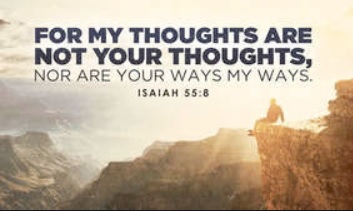
For my thoughts are not your thoughts, neither are your ways my ways. (Isaiah 55:8)
All people possess the knowledge of good and evil. We unknowingly judge all things according to that standard and therefore we are unable to understand God. (Syr Post Std, 6/28/20)
As broken-hearted as God must be over what we have done to the gift of creation, God still has a dream that humans seek spiritual rather than material progress. God dreams of a time when love and mutual respect will bind humanity together, and the profound beauty of creation will be treasured.(Rohr,8/26/20)
God needed us to finally comprehend the truth: God is not a sky king who heads an empire; God is the love that gives itself away for the sake of more love.(Rohr)
The Spirit is in sharp opposition to the easy ways of the world. (p135, God's Pursuitbof Man)
See non-duality / non-judgmental thinking
Infinity and Perfection
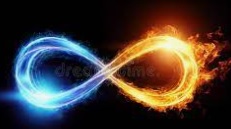
Perhaps we can say that infinity in God is ultimately: (a) internally and qualitatively, absence of all limitation and defect; (b) boundless potentiality.(monergism.com)
The infinity of God has to do with God's perfection. The primary notion of God's infinity is that of denying that which would place him within the finite realm and so make him less than perfect. To say that God is infinite is simply to say that he is not finite. More positively God's infinity enhances those attributes which denote his perfection, such as, He is infinite in goodness, infinite in power, infinite in wisdom and love. There are no limits, bounds, or constraints, whether external or internal, imposed on his perfect being.(encyclopedia.com)
God saw all that he had made, and it was very good. (Gen 1:31) God looked at the sum of all of creation, everything living in balance together and said "This is very good". The goodness of all of creation is in its balance, diversity, and collaboration with the cosmic whole (not human kind alone). (p35, Oneing: Transitions)
Real and Unreal

You can feel God's presence in meditation, then you will see that gradually the Unreal becomes real and this world which you think is real will be seen as unreal.
Know yourself" is a very old Greek maxim... that is, you have to know that your own soul is divine, and then you know that you are immortal, whereas the body is the mortal part of human existence. Now this is radicalized in the Gospel of Thomas into saying that everything that is experienced physically and through sense perception, everything in this world that you can perceive in this way is nothing. It is, at best, chaos and, at worst, it doesn't even exist in reality. The only thing that really exists is your divine spirit or your divine soul, which is identical in its quality with God himself.(www.pbs.org)
Blueprint and Quantum Reality

The quantum world is randomness
Quantum mechanics says, reality is what you choose it to be. (sciencemag.org)
The original blueprint for everything that exists is relationship. John’s word for that was Logos. (John 1:1) Thus, we must read the whole Bible as a school of relationship. A life of prayer helps us develop a third eye that can read between the lines and find the golden thread which is moving toward inclusivity, mercy, and justice. God is still breathing in the Bible which is both inspired and inspiring. Our job is to be like the biblical character Jacob, to wrestle with the mystery until God gives us a blessing. (Rohr)
God is manifest in the ordinary, in the actual, in the daily, in the now, in history, in the concrete incarnations of life. God does not hold out for the pure, the spiritual, the right idea, or the ideal anything. Apparently, the biblical God would much rather be in relationship than merely be right in solitude! This is why Jesus stands religion on its head. God comes to us disguised as our life. The biblical revelation is saying that we are already spiritual beings; we just don’t know it yet. The Bible tries to let us in on the secret, by revealing God in the ordinary. The principle of the Incarnation proclaims that matter and spirit have never been separate.(Rohr)
Reality as Kingdom of God

Religion can be “all in the head.” Peacemaking, forgiveness, and reconciliation are not some kind of ticket to heaven later. They are the price of peoplehood—the signature of heaven—now. The pattern of the universe is that we are one. We don’t have to live competitively. We don’t have to climb or succeed because there’s nothing “up there” that isn’t “right here.” Community has the central position it has as the very root of reality. (Rohr)
The Reign or Kingdom of God is a new world order, a new age, a promised hope begun in the teaching and ministry of Jesus—and continued in us. We only have the first fruits of the Kingdom in this world. We live in a “threshold space” between this world and the next. We learn how to live between heaven and earth, one foot in both, holding them precious together. (Rohr)
Evolution and a Dynamic Understanding of God

From the beginning until now, the entire creation, as we know, has been groaning in one great act of giving birth. —Romans 8:19, 22
Sadly, even resurrection has traditionally been understood as a static, one-time anomaly concerning Jesus. Few saw it as a promise and model for us too (see 1 Corinthians 15:20–25). Life and love are cumulative, growing, and going somewhere that is always new and always more. (Rohr,5/30/21)
The Jesuit scientist Teilhard de Chardin wrote that “Love is the physical structure of the universe.” Our theological way of saying the same thing is “Let us create in our image” (Genesis 1:26), in the image of the triune God, who is love, who is a dynamic cycling of infinite outpouring and infinite receiving. Foundational hope demands a foundational belief in a world that is still and always unfolding to something better. (Rohr,5/31/21)
Ken Wilber offers four major stages: Cleaning Up, Growing Up, Waking Up, and Showing Up. As we love more deeply, we will behave differently (see 1 Corinthians 13:11–13). The social structures that surround us highly color, strengthen, and also limit how much we can grow up and how much of our own shadow self we will be able to face and integrate. The purpose of waking up is not personal or private perfection, but surrender, love, and union with God. This is the Christian meaning of salvation or enlightenment. Showing up is the full and final result of the prior three stages—God’s fully transformed “work of art” (see Ephesians 2:10). (Rohr,6/1/21)
Evolution requires trust in the process of life itself. There is a power at the heart of life that is divine and lovable. (Rohr,6/4/21)
What is impossible with man is possible with God. (Luke 18:27)
There is a rhythm inherent in things: birth and death, light and dark, growth and decline, gain and loss, breathing in and out.11,p69
See what has already been revealed with great clarity—that life and knowledge always build on themselves, are cumulative, and are always moving outward toward ever-greater connection and discovery. There is no returning to a static notion of reality. (Rohr)
The Cartesian Model
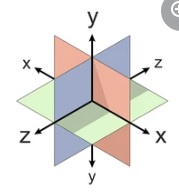
The great problem for the Cartesian consciousness, the 'other' is object with concepts, idolization of the reflective consciousness, verbalism, mathematics, and rationalizations. (p230, Merton's Paradise Journey)
The Zen and Contemplative Model

For it is in giving that we receive. (St Francis of Assisi)
Christian contemplation and Zen are paths to transcendent realization is the path of self-emptying rather than self-fulfillmemt. The limited ego-self must vanish out of the picture altogether because its real status is quite other than what appears empirically. The experience is a unitive one in which the 'other' is perceived not in separation but in oneness where the ego-consciousness is left behind so that the self is not its own center..(p231-3, Merton's Paradise Journey)